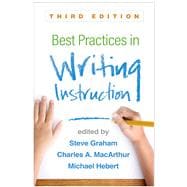Well established as a definitive text--and now revised and updated with eight new chapters--this book translates cutting-edge research into effective guidelines for teaching writing in grades K–12. Illustrated with vivid classroom examples, the book identifies the components of a complete, high-quality writing program. Leading experts provide strategies for teaching narrative and argumentative writing; using digital tools; helping students improve specific skills, from handwriting and spelling to sentence construction; teaching evaluation and revision; connecting reading and writing instruction; teaching vulnerable populations; using assessment to inform instruction; and more.
New to This Edition
*Chapters on new topics: setting up the writing classroom and writing from informational source material.
*New chapters on core topics: narrative writing, handwriting and spelling, planning, assessment, special-needs learners, and English learners.
*Increased attention to reading–writing connections and using digital tools.
*Incorporates the latest research and instructional procedures.
See also Handbook of Writing Research, Second Edition, edited by Charles A. MacArthur, Steve Graham, and Jill Fitzgerald, which provides a comprehensive overview of writing research that informs good practice.
New to This Edition
*Chapters on new topics: setting up the writing classroom and writing from informational source material.
*New chapters on core topics: narrative writing, handwriting and spelling, planning, assessment, special-needs learners, and English learners.
*Increased attention to reading–writing connections and using digital tools.
*Incorporates the latest research and instructional procedures.
See also Handbook of Writing Research, Second Edition, edited by Charles A. MacArthur, Steve Graham, and Jill Fitzgerald, which provides a comprehensive overview of writing research that informs good practice.








